The quote, "Raise your words, not your voice. It is rain that grows flowers, not thunder," imparts a powerful message about the transformative power of gentle and persuasive communication. It suggests that expressing oneself with empathy, patience, and understanding can be more effective in nurturing positive outcomes and fostering growth than resorting to aggressive or forceful behavior. The analogy of rain nurturing flowers emphasizes the notion that kindness, compassion, and constructive dialogue have the potential to cultivate harmonious relationships and encourage personal and collective development. By choosing to elevate our words instead of raising our voice, we demonstrate emotional intelligence, self-control, and respect for others' perspectives. This quote serves as a reminder to prioritize meaningful and considerate communication, recognizing that the art of persuasion lies not in overpowering others but in inspiring and influencing them through sincerity, compassion, and gentle words. At its core, the quote celebrates the value of mindful and respectful communication. By advocating for raising one's words rather than the volume of their voice, it emphasizes the significance of focusing on the content and delivery of our message rather than resorting to aggression or dominance. By choosing to communicate with empathy and understanding, we create a conducive environment for constructive dialogue and open discussion. Moreover, the quote highlights the analogy between rain and the growth of flowers. It reminds us that just as rain nourishes and nurtures flowers, so too does gentle and persuasive communication nurture the growth of relationships and ideas. By adopting a compassionate and patient approach, we encourage others to feel heard and understood, leading to stronger connections and the potential for personal and collective growth. Furthermore, the quote underscores the importance of emotional intelligence in communication. By recognizing the impact of our words and delivery on others, we become more attuned to the power of empathy and emotional sensitivity in fostering harmonious interactions and resolving conflicts. In conclusion, the quote "Raise your words, not your voice. It is rain that grows flowers, not thunder" urges us to embrace the transformative power of gentle and persuasive communication. By prioritizing meaningful dialogue, empathy, and understanding, we create an atmosphere of respect and open-mindedness, promoting personal and collective growth. The analogy of rain nurturing flowers underscores the potential of compassionate and patient communication to nurture relationships and foster harmonious connections. By practicing emotional intelligence and choosing to elevate our words, we inspire and influence others positively, paving the way for more meaningful and constructive interactions in our personal and professional lives. This quote serves as a timeless reminder of the profound impact of considerate and sincere communication, inviting us to be agents of positive change through the art of raising our words rather than our voices.


